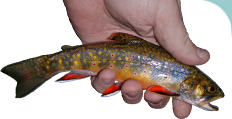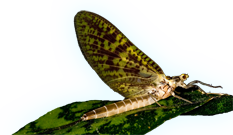Blog & Latest Updates
Fly Fishing Articles
Insects by Common Name


> > Brook trout ate large pieces wood.
| Stewart711 | November 22nd, 2014, 5:30 pm | |
| Long Island, NY Posts: 5 | I came across a dead 15" long female brook trout. I decided to look in its stomach to see what it had been eating. Jammed next to what looked like a ring of muscle at the end of the stomach were (4) pieces of wood, one at 1- 1/2" x 3/8" x 3/8", two pieces at 1-1/2" x 1/4" x 1/4" and a 1-1/2" long 1/8" diameter twig. Does anyone know anything about behavior like this? Has anybody ever seen anything like this? Stewart | |
| Millcreek | November 22nd, 2014, 6:15 pm | |
| Healdsburg, CA Posts: 356 | Sounds like it may have been eating the larvae of Heteroplectron caddisflies. They hollow out pieces of wood to use as cases. Not sure where you are geographically but there are species of Heteroplectron in the eastern and western states. Here is a link to some photos of the western species - http://www.troutnut.com/topic/8629/Heteroplectron-californicum#42121 You'll need to scroll up to the top to see the photo of the cases of mature larvae. Eastern species have a similar case. If you still have the pieces of wood check to see if they have a hole through them. | |
| Stewart711 | November 22nd, 2014, 8:08 pm | |
| Long Island, NY Posts: 5 | Hello Millcreek They were definitely tree branch pieces, not those caddis homes. | |
| Millcreek | November 22nd, 2014, 8:41 pm | |
| Healdsburg, CA Posts: 356 | Stewart711 I tried a Google search for "twigs trout stomach" and twigs seem to end up in trout stomachs fairly often, along with cigarette butts. No real explanation of why they do but maybe they come floating along the top of the water, the fish reacts as if they're food and they're in the stomach before it can spit them out. Be interesting to see if anybody comes up with other ideas about this. Mark | |
| Stewart711 | November 22nd, 2014, 8:47 pm | |
| Long Island, NY Posts: 5 | Hello again Millcreek I think the wood chunks caused a blockage and it starved to death. They were really jammed in there, bundled like firewood. Stewart | |
| Troutnut | November 23rd, 2014, 9:42 am | |
Administrator Bellevue, WAPosts: 2737 | I published a scientific paper this year about drift-feeding fish (juvenile salmon in this case) going after debris. Basically, it's more difficult than you'd guess for fish to tell the difference between insects and debris underwater when it's flying at them at high speed in the current and they only have a fraction of a second to decide whether to grab it or let it pass. Normally they're very good at spitting out debris and only swallowing food, though. What might have happened in this case is that the fish had some good meals of cased caddisflies that looked and mostly tasted like twigs recently, so it started swallowing actual twigs without realizing they weren't the same thing. But there are lots of other possibilities. | |
| Jason Neuswanger, Ph.D. Troutnut and salmonid ecologist | ||
| Creno | November 25th, 2014, 6:35 pm | |
| Grants Pass, OR Posts: 305 | Back in the 70-80's I spent several years looking at 100's of fish stomach contents, including brook, cutthroat, rainbow and browns from Colorado. Both brooks and cuts had a major proportion of their "diet" composed of small sticks and pine needles. Most browns and rainbows from the same high elevation habitats lacked sticks and pine needles. I always suspected that the difference was caused by feeding habits with the brooks and cuts focusing on the surface. All the fish were healthy so I guess it didn't bother them enough to pass what they didn't get nourishment from in order to be sure to get whatever else was floating by. | |
| RMlytle | November 29th, 2014, 9:48 am | |
| Connecticut Posts: 40 | I can't tell enough about you how often I've seen brookies nail those little pine cones and bits of bark. Traditionally, brookies have been found in many places with a lack of food sources. Take your typical small mountain freestone in, say New Hampshire: very little food for insect, very few insects, but still rich with wild brookies. They can only survive by taking everything that comes down their feeding lane. This trait is probably genetically attributable to fishes living in these environments. Rainbows and browns were, traditionally, from more rich water bodies, so it makes sense that they would be more discriminating. | |
| Jmd123 | November 30th, 2014, 10:54 pm | |
| Oscoda, MI Posts: 2611 | Jason, I was in grad school with Mark Wipfli at Michigan State in the late '80s/early '90s! I see he is second author on your paper (Congrats on your Doctorate, Doctor!!) so I assume you know him fairly well? Tell him Jonathon DeNike says hi and has some fun memories to share. Ask him about the Linnean Games when we were all at MSU! Separate congrats on your "Dr. Troutnut" thread! Jonathon | |
| No matter how big the one you just caught is, there's always a bigger one out there somewhere... | ||
| Stewart711 | December 1st, 2014, 8:08 pm | |
| Long Island, NY Posts: 5 | What happened here? Is the the "General Discussion of Fly Fishing, Trout and Salmon, and Stream Insects" section or the stroke the administrator section? Thanks to all for your input. Stewart | |
Quick Reply
You have to be logged in to post on the forum. It's this easy:
Related Discussions
| Title | Replies | Last Reply |
| Onocosmoecus larvae and cases (3 more) In the Photography Board by Millcreek | 0 | |
| Re: The more you know.. In Simuliidae Black Fly Larva by Phineartz | 2 | Jan 17, 2019 by Jmd123 |
| Giant stonefly nymph In the Photography Board by Jmd123 | 0 | |
| Clarks Fork In Fishing Reports by Wbranch | 0 | |
| Re: Stonefly? In the Identify This! Board by Pdcox | 10 | Dec 8, 2019 by Taxon |
| Re: The boys were back in town, part 3 - a double paddling adventure (15 more) In the Photography Board by Jmd123 | 2 | Sep 22, 2017 by Martinlf |
| Re: Just in case we missed it... In General Discussion by Oldredbarn | 4 | Mar 8, 2013 by Sayfu |
| Re: Grannoms In Onocosmoecus unicolor Caddisfly Larva by Martinlf | 11 | May 22, 2008 by GONZO |
| Re: Seaweed in fish's diet? In General Discussion by Shawnny3 | 5 | Jun 28, 2013 by PaulRoberts |
| Re: callibaetis ? In the Identify This! Board by Fredw | 2 | Jul 11, 2013 by Entoman |
Troutnut.com is copyright © 2004-2024 Jason
Neuswanger (email Jason). See my FAQ for information about use of my images.
 privacy policy
privacy policy



